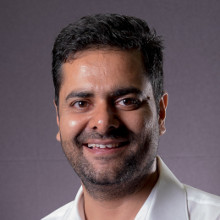[Photograph : Latte by Leeroy]
At the graduation ceremony of a Yoga school in Goa run by a friend, I met an entrepreneur in his mid-forties. He'd sold his software start-up to a global technology company, moved to Goa and built a spectacular house overlooking the sea.
So what are you working on now, I asked. "Nothing," he said proudly. I was puzzled and persisted: "You must be doing something all day?" He replied "I walk my dog. I drop my kids to school."
I wish this was an outlier example, but it’s not. If entrepreneurship is a petri dish that reveals people under a microscope, then Goa - where I live and work - is a research laboratory.
Like flotsam and jetsam from the shipwreck that is India's capitalism, urban castaways are washing up on Goa's shores and declaring "No more!"
You'll find hundreds of wonderfully capable people with the avowed goal of doing nothing. Of course, they bristle at this imputation. And indignantly share schedules chock-full of fitness classes, painting lessons, book club readings, film-appreciation workshops…
Why are increasing numbers of people pining to 'retire by 40'? And why are we envying those who seem to be doing nothing, instead of feeling sorry for them?
Yearning to escape the rat-race is a legitimate desire in a world where Karoshi (Killed by Overwork) is a phenomena that has since decades seeped beyond Japan. In our country, millions experience the death-by-a-thousand-cuts life that working at a corporate job often means.
But such understandable factors apart, there are at least four fallacies that lead to the aspiration of being liberated to do nothing.
The first fallacy is the assumption that money unlocks life's prizes. Alas, people who believe that money solves most problems are usually those who've not had much of it. A few months of being rich rids most of this delusion.
Many entrepreneurs-waiting-for-exit as well as entrepreneurs-in-waiting seem to be chomping at the bit to accumulate an amount they think is their "Duck You Money" [Forgive the anatine substitution. Founding Fuel would blacklist me for using the original.]
If you think a specific sum magically empowers you to say 'Duck You' to your boss, then you should, well…Duck Off. Money or no money, you probably don't have the juice to do it anyway.
If you think a specific sum magically empowers you to say ‘Duck You’ to your boss, then you should, well…Duck Off
The second fallacy is the thought that if we just had enough time, we would triumphantly conquer all our self-actualization goals.
Here's news. There's a reason why few are accomplished at playing the violin, or running the marathon, or painting exceptionally well. The reason is that doing these systematically is difficult, challenging and…gasp, as much like 'work' as crawling-up a corporate ladder. Just having ten empty hours every day does not catalyze you into a Renaissance Man.
The third and more ingrained fallacy is the utopian belief that human beings were somehow designed for a simple life.
Of course, reducing complexity makes life easier. Juggling with one ball is simpler than juggling three. But is it an achievement that improves your sense of self?
Complexity is not our enemy. The human neocortical brain is designed for more complexity than a dog. The three dogs I have at home like nothing better than to sun themselves in the garden for hours. But that's no reason to design my life around the same goal.
The fourth fallacy is that people should aspire to a peaceful life, without conflict and challenge.
Yes, most of us would benefit if our lives and relationships didn't look like the inside of a running mixer-grinder. Yes, a day or three of unstructured time spent puttering about is often a tonic. But multiplying that into an everyday routine is toxic.
My wonderful colleagues (rightfully) complain that my relentless drive for improvement occasionally turns me into a Rottweiler who's had six espressos. I respond with borrowed insight from John Stuart Mill, who asked if we would prefer to be a grumpy Socrates or a contented pig.
My sensitivity to these fallacies comes not from wisdom, but from being foolish enough to be misled by almost every one of these at different points in life.
So why the finger-wagging? Can't each one navigate by the lighthouses they choose?
Certainly we can. Choosing options different from social templates is commendable. But it's a problem when misdirected beliefs multiply and become societal lodestars. When our best and brightest trade-in a life that challenges them for something that atrophies them, we all lose.
When our best and brightest trade-in a life that challenges them for something that atrophies them, we all lose.
If young people suffer from the delusion that the goal is to retire at 40, then their action vectors re-align. As just one example, it often changes focus to flipping companies for a quick 'score' instead of building them for sustained value.
The choice is not binary. We don't have to be either a chunk of coal in the engine room of business or be a cotton-candy butterfly that flutters through a series of fancies with four-week life spans. Giving up on the pursuit of purposeless money-making should NOT equate to giving up on the pursuit of meaningful contribution.
Many born-again evangelists for a slow-and-simple life loftily proclaim that we're ignoring our fundamental nature and driving ourselves like race-hounds because we're hypnotized by twenty-first century materialism.
To anyone familiar with even the basics of evolutionary biology, such beliefs are laughably simplistic. Not once in roughly 5,000 years of documented human existence has any community floated around with vacuous smiles, blissed-out by days spent in random inanities. Human beings are hard-wired to engage and strive. And if their fundamental nature lacked this drive, would you exist today or know how to read English?
This drive is indeed accelerated by capitalism - occasionally insidiously, often pointlessly - but not birthed by it. It is part of our encoding as human beings. Retiring at 40 will not leach it from us. Like calcium-deficient children unthinkingly gnawing at chalk, we will still seek it out.
We seek challenges because that's how humans grow. We don't become stronger by grappling with air in slow-motion. We grow better only when we wrestle in a way that strains our sinews, makes the sweat run down our foreheads and forces our heart to clench.
Of course, wrestling with life is difficult, complicated and carries the danger of injury. And of course we have to constantly re-balance to ensure that our challenges are in tune with our capacities. But only schoolboys assume that friction needs to be eliminated. Engineers know that without friction, nothing in the world would move.
We must indeed withdraw from a pattern of life that will break us. But shouldn't we embrace one that stretches us? Stretches us every day into a better version of ourselves.
[This article appeared concurrently in Mint]


